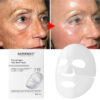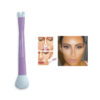Many people, both men and women, worry about hair loss. They wonder if herbal supplements can help with hair growth. Could natural solutions fight hair thinning and encourage new hair without the side effects of regular treatments?
With more people interested in natural hair growth remedies, herbs like ginseng, horsetail, and red clover are getting attention. Research suggests some herbs might slow down hair loss or even help new hair grow. But, it’s crucial to look at the science and the need for more studies to prove their effectiveness1.
So, let’s explore how these herbal supplements could help. Are they the solution we’ve been searching for?
Key Takeaways
- Many people are looking for alternatives to traditional hair loss treatments.
- Herbal supplements may slow hair loss and promote new growth.
- Common options include ginseng, horsetail, and red clover.
- Scientific evidence is still needed to validate the effectiveness of these remedies.
- Using herbal remedies without supervision could pose risks, especially for pregnant or breastfeeding women.
The Basics of Hair Growth
The hair growth process is complex and involves three main hair growth stages: anagen, catagen, and telogen. The anagen phase is the most active, where hair follicles produce new hair. This phase can last from 2 to 6 years, affecting hair length.
After that, the catagen phase lasts about 2 to 3 weeks. During this time, growth stops and the follicle shrinks. The telogen phase lasts about 3 months, leading to hair shedding and preparing for new growth.
It’s normal to shed 100 to 200 hair strands a day, which is part of the natural cycle2. Knowing these hair growth stages helps manage hair concerns, especially hair loss. People with hair loss for 2 to 3 years may see better results from treatments than those with longer hair loss2.
Proper care and nutrition are vital for healthy hair maintenance. Vitamins A, B-complex, C, and D are essential for hair health. Deficiencies can cause hair problems3. The RDA for vitamin A is 700 micrograms for women and 900 micrograms for men, which is important for hair follicle health2.
Understanding the hair growth process and eating a balanced diet rich in essential vitamins can lead to healthier hair. It may also help prevent excessive hair loss.
Understanding Causes of Hair Loss
Exploring the causes of hair loss reveals many factors at play. Genetics is a big one, especially for androgenetic alopecia. This genetic link can cause hair to thin and fall out over time4.
Hormonal changes also play a role. Events like pregnancy, menopause, and thyroid issues can lead to hair loss. For instance, low iron and zinc levels have been linked to more hair shedding5.
Nutrient deficiencies harm hair health. Not getting enough vitamins like B12, D, and iron can make hair loss worse4. Stress is another factor, causing a temporary hair loss called telogen effluvium.
Understanding these causes is key before starting treatments. Knowing the exact causes of hair loss helps find the best solutions. This includes herbal remedies that tackle the root cause, not just the symptoms. Knowing my specific situation helps me choose the right path to manage hair loss.
| Factor | Potential Impact | Examples |
|---|---|---|
| Genetics | Predisposition to hair loss | Androgenetic alopecia |
| Hormonal Changes | Triggered hair loss | Pregnancy, menopause |
| Nutrient Deficiencies | Increased shedding | Vitamin B12, iron |
| Stress | Temporary hair loss | Telogen effluvium |
How Do Herbal Supplements Work?
Understanding how herbal supplement mechanisms help hair grow is key for those looking into natural hair loss remedies. These supplements aim to improve blood flow, block DHT, and feed hair follicles. Remember, hair grows only half an inch a month on average, so patience is crucial6. Active compounds in these supplements help absorb important vitamins and minerals for healthy hair.
Zinc helps control DHT levels in the body. Low zinc can cause too much DHT, leading to hair loss7. Iron is also vital, as a lack of it can cause anemia and disrupt hair growth7. Biotin, a water-soluble vitamin, strengthens hair and nails, showing the botanical extracts benefits of many herbal supplements.
Protecting hair from environmental harm is another benefit. Vitamin E, found in plant-based foods, shields hair from sun damage. This prevents health decline and hair loss. In short, adding these natural treatments to your routine can greatly help your hair health.
Herbal Supplements for Hair Growth
Exploring herbal hair growth options can lead to noteworthy improvements in hair health. Many individuals seek alternatives that align with natural remedies and are rich in plant-based hair nutrients. I find that integrating these supplements into my routine provides essential support and revitalizes hair growth.
Common Herbal Options
Numerous herbal options have gained recognition for their potential benefits in promoting hair growth. Here are a few noteworthy choices:
- Ginseng: Traditionally used for centuries, ginseng may help regulate proteins that influence hair cycling, promoting healthy hair growth and preventing loss8.
- Hibiscus: This plant has shown promise in some studies for increasing hair growth and overall hair health8.
- Rosemary Oil: Comparable to the effects of minoxidil, rosemary oil promotes hair growth supported by research8.
- Saw Palmetto: Studies reveal that saw palmetto extracts can effectively repress 5-alpha-reductase levels, offering benefits for managing hair loss9.
Mechanisms of Action
The effectiveness of these herbal DHT blockers and plant-based hair nutrients lies in their unique mechanisms. They work by:
- Inhibiting DHT Production: Dihydrotestosterone (DHT) is a primary factor in hereditary hair loss. Herbal supplements, such as saw palmetto, can inhibit DHT-related hair loss without impacting testosterone levels9.
- Enhancing Blood Circulation: Plant extracts like ginseng and peppermint oil may help increase blood flow to the scalp, enhancing nutrient delivery to hair follicles8.
- Nourishing Scalp Health: Ingredients such as aloe vera and rose water have anti-inflammatory properties, soothing the scalp and fostering a healthier hair environment8.
By incorporating these natural remedies, I appreciate the potential improvements they bring. They align perfectly with my desire to embrace holistic approaches to enhance my hair vitality.
The Benefits of Using Herbal Remedies
Herbal remedies for hair care have many benefits of herbal supplements that synthetic products can’t match. They are gentler, making them perfect for sensitive scalps. Many people choose them for their natural ingredients and holistic approach.
Herbal remedies have natural remedies advantages like fewer side effects and the chance for herbs to work better together. Studies show that some herbal extracts can really help hair grow by making follicles stronger and the scalp healthier. For example, sinapic acid can make hair follicles grow by affecting certain cells10. Caffeine also helps with important hair follicle functions, showing herbal components’ value10.
It’s interesting to see how different cultures have used herbs in their hair care for centuries. These remedies not only improve hair quality but also nourish the scalp and support hair growth. Ginseng and oleuropein, for instance, have shown great potential in making hair grow naturally10.
| Herb | Mechanism | Benefits |
|---|---|---|
| Ginseng | Stimulates follicle growth | Improves hair density and strength |
| Geranium Sibiricum | Activates dermal papilla cells | Promotes hair thickness |
| Caffeine | Regulates growth factors | Enhances hair follicle proliferation |
| Oleuropein | Induces anagen phase | Supports healthy hair growth |
With all the evidence about herbal remedies’ effectiveness, adding them to my hair care feels right and enriching. Their long history in cultures shows their trustworthiness and faith in nature’s healing.
Top Herbal Supplements to Consider
Looking into the best herbal supplements for hair growth, we find some standouts. Each offers unique benefits that support hair health and growth.
Ginseng for Follicle Stimulation
Ginseng is known for its benefits, especially in stimulating hair follicles. Studies show it boosts blood flow to the scalp, leading to stronger hair. Its antioxidants also fight oxidative stress, a cause of hair loss.
Brahmi and Its Benefits
Brahmi is a top choice for hair growth. It’s known for nourishing hair and reducing dryness. It strengthens hair strands and improves scalp health, making it great for hair care.
Red Clover as a DHT Blocker
Red clover is praised for its ability to block DHT, a hormone causing hair loss. By stopping DHT, it may prevent hair thinning and enhance hair density. Adding red clover to your hair care can greatly help with hair loss1112.
Safety and Side Effects of Herbal Supplements
When thinking about adding herbal supplements to my routine, safety is key. Many people don’t think about the side effects of herbs, which can be serious. Knowing these risks helps me make smart choices about herbal remedies.
Understanding Allergic Reactions
Allergic reactions to herbs can be dangerous. For example, chamomile can cause problems for those allergic to ragweed. Echinacea, popular for boosting the immune system, can also cause allergic reactions in some. It’s important to know these risks before using herbal supplements.
Interactions with Other Medications
Herbal supplements can also interact with other medicines. Some herbs, like black cohosh, can have unexpected effects when taken with other drugs. Talking to a healthcare professional about using herbal supplements with other treatments is crucial. Since herbal supplements aren’t regulated like drugs, their safety and effectiveness aren’t always proven before they’re sold13. So, it’s wise to stay informed about possible interactions to keep my health safe.
| Herb | Potential Side Effects | Allergic Reactions |
|---|---|---|
| Chamomile | Allergic reactions, sedation | Yes, for ragweed allergy |
| Echinacea | Allergic reactions, gastrointestinal discomfort | Yes, in sensitive individuals |
| Black Cohosh | Potential liver damage, gastrointestinal issues | Reports exist, but causation unclear |
| Arnica | Toxicity when ingested | No detectable plant substance in homeopathy |
| Aloe (oral use) | Severe laxative effect, decreased potassium | No specific allergic reactions noted |
The U.S. spends about $13 billion a year on natural supplements. Knowing the risks is crucial13. I suggest doing patch tests and talking to a healthcare provider before using herbal supplements. This way, you can use them safely and avoid bad side effects.
Applying Herbal Remedies Effectively
Adding herbal remedies to my hair care routine has been a game-changer. I use herbal hair oils, ointments, and gels to target specific hair problems. Knowing how to apply these treatments is key to getting the most out of them.
Herbal Hair Oils
Herbal hair oils are known for their many benefits. I’ve found that oils with rosemary, peppermint, and coconut oil are great for scalp health and hair growth. Herbal hair oils benefits include better blood flow, which helps hair grow.
- Coconut oil: A safe choice, but there’s not much proof it boosts hair growth.
- Rosemary oil: It’s as good as over-the-counter meds for growing hair.
- Peppermint oil: It boosts blood flow to the scalp, but you need to dilute it to avoid irritation.
Polyherbal Ointments and Gels
Using polyherbal ointments and gels is a great way to fight hair loss. I’ve seen how different herbs work together. For example, red ginseng can make hair thicker and activate follicles. Onion juice, with its sulfur, helps hair grow.
| Ingredient | Key Benefit |
|---|---|
| Red Ginseng | Improves hair thickness and activates follicles |
| Onion Juice | Strengthens hair and hydrates the scalp |
| Rosemary Oil | Stimulates hair growth comparably to minoxidil |
| Peppermint Oil | Enhances blood circulation to the scalp |
Using herbal remedies wisely is a big part of my hair care routine. By knowing how herbal hair oils and treatments work, I can help my hair grow better14.
Combining Herbal Supplements with Other Treatments
I think mixing herbal supplements with traditional hair loss treatments can really help. This way, we tackle hair growth from all angles. It’s about improving hair health and overall well-being.
Integrating with Traditional Hair Loss Treatments
Herbal supplements paired with treatments like minoxidil and finasteride can be a strong plan. Research shows some meds can cause hair loss. Knowing this helps us choose better treatments15.
For instance, minoxidil works well, but herbs like ginseng and red clover can make it even better. They help hair follicles grow and block DHT.
Diet and Lifestyle Changes
What we eat greatly affects our hair. Eating foods full of biotin is key for hair health. Many women with hair loss lack biotin, which hinders hair growth16. Adding herbal supplements to a balanced diet boosts results. It’s vital to eat foods packed with vitamins, minerals, and proteins.
| Factor | Examples | Impact on Hair Growth |
|---|---|---|
| Herbal Supplements | Ginseng, Brahmi, Red Clover | Stimulate follicles, block DHT |
| Traditional Treatments | Minoxidil, Finasteride | Promote hair growth, prevent loss |
| Dietary Factors | Biotin, Protein-rich foods | Support overall hair health |
| Lifestyle Changes | Stress management, proper hair care | Reduce risk of hair shedding |
In summary, using a mix of treatments, diet, and lifestyle changes can greatly improve hair restoration16.
Consulting Healthcare Professionals
It’s crucial to talk to a healthcare expert before starting any herbal treatment, especially if you’re losing a lot of hair or have health problems. Getting professional advice helps make sure the herbs you choose are right for you. Since 80 million people in the U.S. deal with hair loss, getting expert help is key17. Losing up to 100 hair strands daily means managing hair loss is vital18.
Doctors often suggest the best ways to use herbal supplements with regular treatments. Herbs like ginseng, saw palmetto, and aloe vera might help fight hair loss by blocking DHT17. A doctor’s guidance helps you use these herbs safely.
Getting advice from healthcare pros ensures you manage hair loss well. This might include using FDA-approved treatments like Minoxidil and Finasteride18. This careful approach not only helps your hair but also boosts your overall health.
Consumer Experiences and Testimonials
Looking into user reviews of herbal supplements gives us a better view of their effects on hair growth. Many people share their experiences, showing both good and bad results.
Many users say they see positive changes with products like Nutrafol. It uses ingredients like curcumin and ashwagandha to fight thinning hair. Up to 80% of men and 50% of women will lose hair by age 80, making good solutions important19.
People often talk about how well supplements like saw palmetto and pumpkin seed oil work. Even though only 9.1% of ISHRS members often prescribe saw palmetto, those who use it see different levels of success in stopping hair loss20.
In testimonials on hair growth, users stress the importance of regular blood tests. This is to check vitamin and mineral levels, as low levels can happen even with supplements. Dr. Keene points out that at least 30% of patients have vitamin D deficiencies, which can harm hair20.
Also, many are careful about claims made by hair growth supplements. Some warn about being careful with terms like “clinically tested,” as they don’t get the same checks as FDA-approved products20. When people don’t see the results they hope for, they get upset and look for other options.
In summary, customer experiences show a mix of results. Some find herbal remedies that help their hair, while others need more than just supplements. This insight can help newcomers make better choices.
| Supplement Type | User Satisfaction | Common Ingredients |
|---|---|---|
| Nutrafol | High | Curcumin, Ashwagandha, Saw Palmetto |
| Saw Palmetto | Mixed | Plant Extract |
| Pumpkin Seed Oil | Positive | Plant Extract |
Conclusion
Looking back, herbal supplements can really help with hair growth. Studies show that certain plant extracts, like those from Murraya koenigii and Nigella sativa, boost hair growth. They help dermal papilla cells grow, which is key for hair2122.
While they’re not a magic fix, adding them to your hair care plan can help. Especially when you use them with other treatments.
In my last thoughts on hair growth, I suggest trying natural hair care. Things like coconut oil and hibiscus are great for hair and simple to add to your day. I’ll keep watching how safe and effective they are, and I hope you will too.
By mixing knowledge with natural solutions, we can tackle hair loss. With some patience and the right products, we can get healthier hair.









